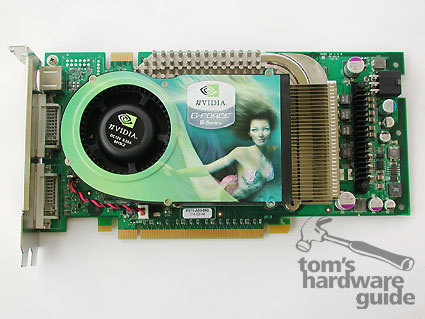Intel Stakes Its Vision of the PC Future with 775 Launch
Obstacles And Hurdles
The GeForce 6800 Ultra PCIe is one of the best graphics cards to go. While the AGP version runs at 400 MHz, the PCIe model we received ran at 435 MHz. We underclocked it to 400 MHz in order to receive results that allow for a comparison between the old and the new platform.
As we had to ship our only GeForce 6800 Ultra PCIe card from one lab to the other, we wanted to start benchmarking by overclocking the 6800 GT cards. These run at 350 MHz core and 475 MHz memory clock speeds, while the Ultra clocks at 400/550 MHz. An overclocking tab can be forced to show up in all recent ForceWare graphics driver versions by adding a few modifications to the Windows registry.
NVIDIA's driver is kind enough to check the desired settings before applying them. Strangely, the driver did not allow for the memory clock to be set to the Ultra's 550 MHz with none of our three GT boards. On the other hand, 545 MHz could be easily selected. Is this a coincidence?
We had been willing to live with the 5 MHz memory clock speed difference, but a couple of benchmark showed that the overclocked GTs' results were too far away from the numbers a 6800 Ultra was able to produce.
We wanted to use the idle time as good as possible, so we unwrapped some synthetic benchmarks to start with. We found SiSoft's Sandra 2004 to be useless for the DDR2 platforms, as it declared the Pentium 4 560 to have 150 MB/s less memory throughput than the slower clocked versions. That is hardly possible and does not reflect the real-life benchmark results either. Well, the makers of Sandra know about the problem and are ready to release a SP2. As you can imagine, our attempts to receive that update in advance failed. As a replacement, we introduced Wstream into our benchmark suite.
More obstacles were caused by the ICH6 Southbridge, as Intel upgraded the Serial ATA controller to an AHCI model (Advanced Host Controller Interface). That was required in order to support command queuing, by the way.
As a result, compatibility to the ICH5 is gone now. Upgrading a 845/865/875 Windows installation to run with 915/925 is possible for systems running a single UltraATA system drive by simply selecting Microsoft's default storage driver before exchanging the motherboard. If you're running an ICH5 RAID setup there is no way to get around Windows complaining about an 'inaccessible boot device' after installing an ICH6 platform. Your only option here is to reinstall Windows.
Get Tom's Hardware's best news and in-depth reviews, straight to your inbox.

Patrick Schmid was the editor-in-chief for Tom's Hardware from 2005 to 2006. He wrote numerous articles on a wide range of hardware topics, including storage, CPUs, and system builds.
